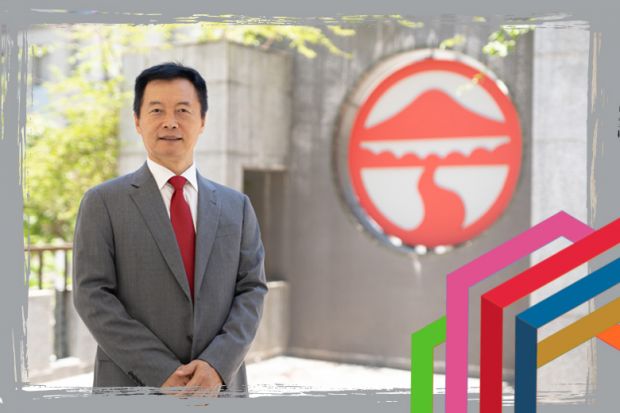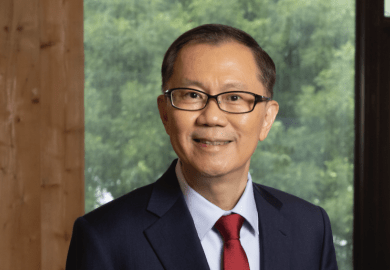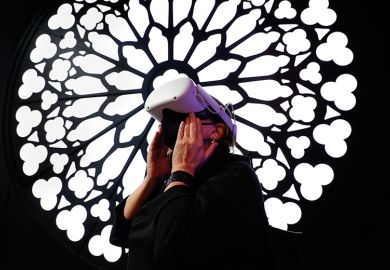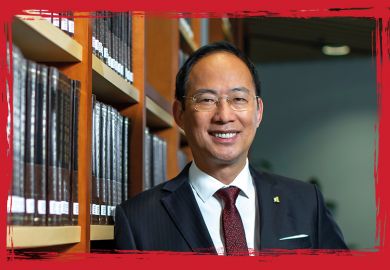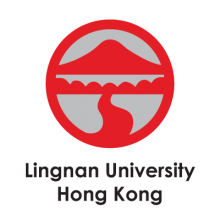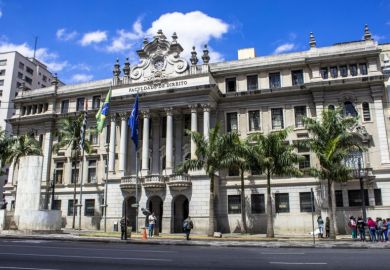Many say we are now in a fourth industrial revolution, with technological advances fundamentally changing how we live and work. Joe Qin prefers to see the shift as an “intellectual revolution”.
“It is revolutionising our cognitive ability – how we read, write, listen and translate or generate content,” says the president of Lingnan University Hong Kong. It is also transforming education and research at the liberal arts institution, which ranks highly for quality education (SDG 4) in the Times Higher Education Impact Rankings.
In the past 10 to 15 years, Lingnan has focused on the arts. “The recent emergence of data science and other interdisciplinary sciences gives us the opportunity to enhance our science side,” says Qin, who plans to steer the university into the digital era.
“Sometimes I call it a liberal arts revolution,” he adds.
Last month, the university opened a new school of data science, five years after launching an undergraduate programme on the subject, and from September all undergraduate students will be required to take a course on generative AI. The institution is also in the process of proposing new undergraduate programmes on interdisciplinary fields such as social data science or digital arts.
A year ago, the instinct for many universities was to ban or severely restrict the use of ChatGPT and other AI tools on campuses because of the risk that students would use it to cheat. While institutions are now generally more accepting of the technology, most still have strict limits on its use.
Lingnan, however, has done the opposite: AI tools are “freely available to our students and staff”, according to Qin. In fact, students will sometimes be required to use AI on essays or to complete exams or projects, to test whether they are “AI literate”. The technological advancements over the past year have only “reinforced” the university’s position in embracing the tools, he says.
“If you don’t let [students] use it, how can you make sure they will use it properly? The best way is to let them use it while they are studying and on campus and [while they] have the guidance from professors,” he says.
“We cannot simply ignore it. We want our students to have the skills of the future, not the past.”
Qin stresses that it is “up to the instructors to form the assignments”, but one example he suggests is asking students to share the sequence of prompts they input into ChatGPT and their thought processes behind them, as well as any generated content.
“You don’t always get the answer [you want] the first time you use it. You have to change the way you interact with ChatGPT,” he explains. “That process is actually the way we would use it for our professional work. We want our students to get that training.”
While many previous digital advances have been accessible only to highly trained individuals, generative AI makes technology “easier for the average person to use”, says Qin, adding that the changes have been welcomed on campus.
“We see this as an equaliser, rather than a divider,” he explains.
Qin is just nine months into his tenure as president of Lingnan. The new digital direction for the university was identified by the council before his appointment, and he was deemed a fitting choice to lead the strategy. He certainly seems to tick all the boxes: he is a world-leading data scientist, originally from mainland China, who spent 24 years in US academia before taking on leadership positions at two other Hong Kong institutions.
“Without the previous experience and understanding, it would be hard for me to figure out how to drive AI for the advantage of Lingnan,” he says.
Perhaps unsurprisingly given his expertise, Qin takes a data-driven approach to major strategic decisions – as well as more prosaic duties, such as managing staff complaints.
“If colleagues say they teach too much, I want to see the data. What’s the average teaching load, which means how many courses each professor teaches a year? Once we get the data from different faculties, different departments, then you know whether they’re teaching too many or too few [courses],” he says.
“For anything I want, there is data. Even for student homework, it’s all archived electronically. So it is a lot easier to use data now to manage the university.”
Qin has analysed figures on class sizes – an important metric for liberal arts universities, which tend to favour close interactions between academics and students. He was pleased to discover that there are just 21 students, on average, per class, particularly given that Hong Kong’s public universities will soon be able to admit twice as many “non-local” undergraduate students. The government cap on non-locals will rise from the current 20 per cent to 40 per cent in September.
“If we want to add more students to each class, it’s not going to create a huge problem for us,” Qin explains. “We have room to make it a little bigger and still be healthy.”
Last year, Lingnan won the Student Recruitment Campaign of the Year prize at the Times Higher Education Awards Asia, for an initiative that helped it to reverse a downward trend in student applications prior to 2020. Its campaign included the development of “LingSpace” – a chatbot game that provides prospective students a preview of its learning experience and replicates the university campus in a virtual environment.
However, not all liberal arts institutions would be feeling buoyant about the prospect of increasing enrolments at a time when there is a wider trend towards STEM programmes.
Some have even argued that liberal arts education cannot survive in Asia, following the closure of Yale-NUS College in 2021 (the National University of Singapore has since formed NUS College, focusing on interdisciplinary education).
However, Qin says, Asia is still the “growing area” for liberal arts education globally, whether at a stand-alone university or a college within a larger institution.
And he believes that the acceleration of generative AI makes liberal arts education even more relevant.
“A lot of the skills-based training will actually be largely replaced by AI,” he says, citing simultaneous interpretation as one profession that will “disappear”.
“However, it’s the critical thinking that one would need.”
Still, he recognises that that view is not necessarily widely held, even today.
“Especially in China, the first thing that parents worry about is whether their kids can get a job. They still think that studying STEM would give them a good job. But I don’t think the future is supporting that,” he says. “Where you used to need 10 computer programmers, now you probably just need one…That one surviving [programmer] might use AI a lot, and [they] will need to know whether the AI-generated content is suitable.”
While Qin is not worried about the future of the liberal arts, he is concerned about ensuring that younger generations continue to receive a rigorous education, so they gain the expertise and the values necessary to work effectively with AI.
“For us as adults, we have already established a knowledge system within an area, [and] we can use it [to] judge whether generated content is good or not. But imagine…a primary school kid – they don’t know whether something is trustworthy or just nonsense,” he says.
“We still need to have a rigorous learning process to bring up kids with a traditional value system. That process cannot be escaped.”
ellie.bothwell@timeshighereducation.com
This is part of our “Talking leadership” series with the people running the world’s top universities about how they solve common strategic issues and implement change. Follow the series here.
Browse the full results of the Impact Rankings 2024
Register to continue
Why register?
- Registration is free and only takes a moment
- Once registered, you can read 3 articles a month
- Sign up for our newsletter
Subscribe
Or subscribe for unlimited access to:
- Unlimited access to news, views, insights & reviews
- Digital editions
- Digital access to THE’s university and college rankings analysis
Already registered or a current subscriber?
